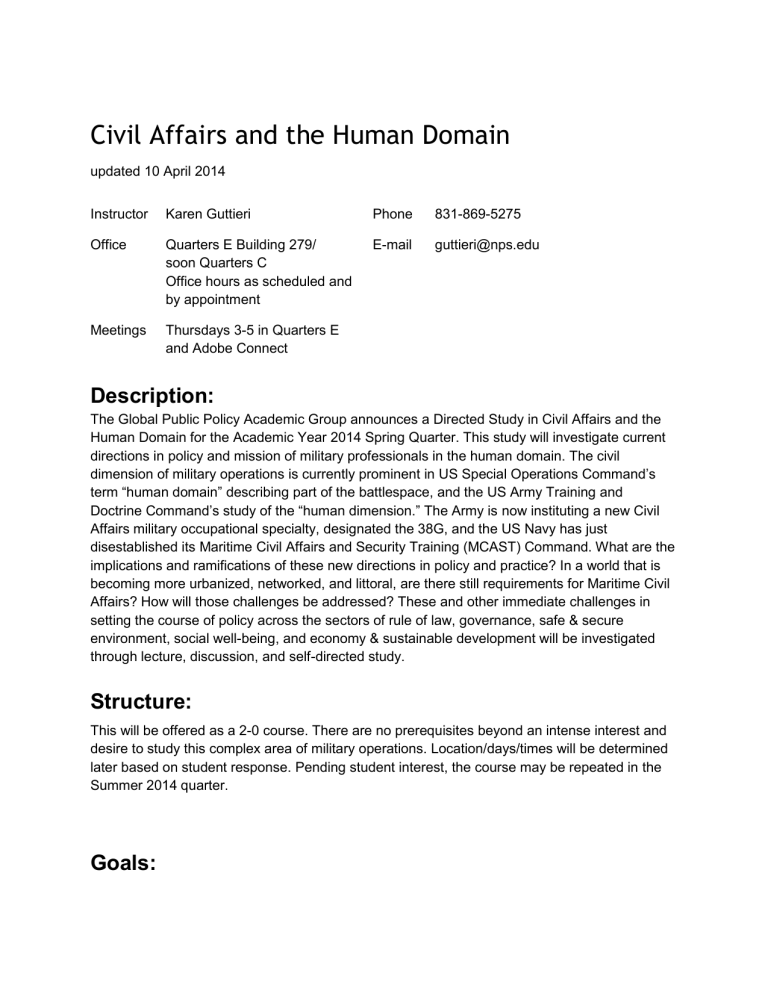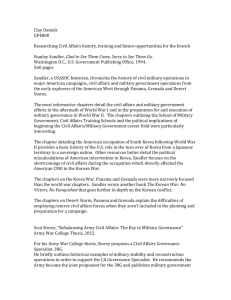CivilAffairsDirectedStudydraftsyllabus

Civil Affairs and the Human Domain
updated 10 April 2014
Instructor Karen Guttieri Phone 831-869-5275
Office Quarters E Building 279/ soon Quarters C
Office hours as scheduled and by appointment
E-mail guttieri@nps.edu
Meetings Thursdays 3-5 in Quarters E and Adobe Connect
Description:
The Global Public Policy Academic Group announces a Directed Study in Civil Affairs and the
Human Domain for the Academic Year 2014 Spring Quarter. This study will investigate current directions in policy and mission of military professionals in the human domain. The civil dimension of military operations is currently prominent in US Special Operations Command’s term “human domain” describing part of the battlespace, and the US Army Training and
Doctrine Command’s study of the “human dimension.” The Army is now instituting a new Civil
Affairs military occupational specialty, designated the 38G, and the US Navy has just disestablished its Maritime Civil Affairs and Security Training (MCAST) Command. What are the implications and ramifications of these new directions in policy and practice? In a world that is becoming more urbanized, networked, and littoral, are there still requirements for Maritime Civil
Affairs? How will those challenges be addressed? These and other immediate challenges in setting the course of policy across the sectors of rule of law, governance, safe & secure environment, social well-being, and economy & sustainable development will be investigated through lecture, discussion, and self-directed study.
Structure:
This will be offered as a 2-0 course. There are no prerequisites beyond an intense interest and desire to study this complex area of military operations. Location/days/times will be determined later based on student response. Pending student interest, the course may be repeated in the
Summer 2014 quarter.
Goals:
Students will have opportunity to contribute to current research in defining requirements for the
38G position and for investigating the future of Maritime Civil Affairs. For students interested in modeling complex environments, there will be opportunity to contribute to formulation of a model of the principal sectors (rule of law, governance, safe & secure environment, etc.) and their interrelationships.
Army Civil Affairs Questions
1.
What are the activities of the 38G?
[Vacha white paper, Vacha spreadsheet and CRC as starting point]
2.
What do the 38G need to know?
[IPRs, Guiding Principles]
3.
According to the requirements, who are the 38G? a.
What are the classifications?
[Guiding Prinicples, IPRs] b.
How to write the job descriptions
[functional specialties brief, ROL, Soc and Econ examples] c.
What are the tiering of the classifications?
[MB Tiering doc] d.
What are the civilian certificates and years of experience required of the 38G?
[IPRs, Dept of Labor, CRC example] e.
Is education or certification development needed?
[IPRs, desk research]
Maritime Security Questions
1. What is the Navy's strategy for the civil dimension? What drove the force structure development for MCAST and MCA? How are MCA recruited and trained? What are the criteria to measure effectiveness of Aquaculture, Community Watch on the Water, and other Navy Maritime Civil Affairs programs?
2. What conditions are changing that affect the work of MCA? What civilian and military capacities are needed for effective civil-military operations in littoral and near-shore environments? What is at risk for nations with troubled coastlines? How is the Navy currently supported by CA in the littoral? Where might those capacities resident elsewhere? Can lessons of recent missions in Kenya, Panama, Tanzania and the
Philippines, for example, be generalized to other locales?
3. What are the lessons from operational experiences that are needed now and for the future? What conditions are changing that may affect operations? How will the DoD perform the maritime civil affairs role in critical regions in future? Is MCAST in the
Reserves the right answer? If MCAST is disbanded, what are the implications for DoD and the whole of government? What alternative capacities might fill any gaps? How will
DoD be able to perform Civil Affairs in the maritime region?
Requirements:
Assignment Points Deadlines
Focus paper proposal 10
60 Research paper
Participation 30
There will be one research paper of 15 pages on a topic relevant to you and a theme from this course. The paper topic will be chosen in consultation with the instructor. The research must include scholarly sources as well as any policy, doctrine and media references relevant to the topic. References will use the Turabian/Chicago manual of style. The papers will be reviewed for plagiarism using Turnitin. You will submit a draft for peer review, and you yourself will review another person’s paper.
Purdue’s Online Writing Lab offers a guide for many types of writing that you will be doing for the certificate courses.
Presentations will be required for many of the assignments. Participation is an important component of the course. This includes engagement online and in-residence.
Required Texts:
1. Kilcullen, David, Out of the Mountains: The Coming Age of the Urban Guerrilla
2. USIP and PKSOI, Guiding Principles for Stabilization and Reconstruction. United States
Institute of Peace and United States Army Peacekeeping and Stability Operations
Institute, 2009.
3. International Commission on Intervention and State Sovereignty., Gareth J. Evans,
Mohamed Sahnoun, and International Development Research Centre (Canada). The
Responsibility to Protect : Report of the International Commission on Intervention and
State Sovereignty . Ottawa: International Development Research Centre, 2001. http://responsibilitytoprotect.org/ICISS%20Report.pdf
4. Roberts, Adam. " Transformative Military Occupation: Applying the Laws of War and
Human Rights ." The American Journal of International Law 100, no. 3 (2006): 580-622.
5. Sarah Sewall, Dwight Raymond and Sally Chin, Mass Atrocities Response Operations:
A Military Planning Handbook, Carr Center for Human Rights Policy, US Army
Peacekeeping and Stability Operations Institute, 2010.
6. United States, Chairman US Joint Chiefs of Staff. Civil-Military Operations , JP 3-57.
Washington, DC: CJCS, 2008.
7. United States, Headquarters Department of the Army. Civil Affairs Operations FM 3.05-
40. Washington, DC: U.S. Army, 2010.
8. ———. Stability Operations, FM 3-07. Washington, DC: U.S. Army, 2008.
9. Readings as assigned.
Directed Study Course Schedule
Week 1 April 3
Introduction to Civil Affairs and Institute for Support to Military Governance
● Study research site for Governance Innovation for Security and Development
● Maritime Civil Affairs research project
● United States, Chairman US Joint Chiefs of Staff. Civil-Military Operations , JP 3-57.
Washington, DC: CJCS, 2008.
● United States, Headquarters Department of the Army. Civil Affairs Operations FM 3.05-
40. Washington, DC: U.S. Army, 2010.
● ———. Stability Operations, FM 3-07. Washington, DC: U.S. Army, 2008.
Week 2 April 9
Refining student interests for graduate programs
● Sites for Stability, Security and Development in Complex Operations and Civil Military
Operations and the Rule of Law curricula
● USIP and PKSOI, Guiding Principles for Stabilization and Reconstruction. United States
Institute of Peace and United States Army Peacekeeping and Stability Operations
Institute, 2009.
Week 3 April 16
The Army and Military Governance
● Conference with research faculty
● Masters of Peace
● Guttieri, “The Civil Dimension of Strategy”
Week 4 April 24 - Adobe Connect
Governance in the Maritime Domain
● Prof Jeff Kline
● A Cooperative Strategy for 21st Century Seapower, 2007
● A Comprehensive Approach to Operations in Complex Environments, 2014
Week 5 May 1
Safe and Secure Environment
● Kilcullen, David, Out of the Mountains: The Coming Age of the Urban Guerrilla
● International Commission on Intervention and State Sovereignty., Gareth J. Evans,
Mohamed Sahnoun, and International Development Research Centre (Canada). The
Responsibility to Protect : Report of the International Commission on Intervention and
State Sovereignty . Ottawa: International Development Research Centre, 2001. http://responsibilitytoprotect.org/ICISS%20Report.pdf
●
Sarah Sewall, Dwight Raymond and Sally Chin, Mass Atrocities Response Operations:
A Military Planning Handbook, Carr Center for Human Rights Policy, US Army
Peacekeeping and Stability Operations Institute, 2010.
● This is what winning looks like documentary
Week 6 May 8
Sustainable Economic Development
Week 7 May 15
Stable Governance
Week 8 May 22
Social Well-being
Week 9 May 29
Rule of Law
Roberts, Adam. " Transformative Military Occupation: Applying the Laws of War and Human
Rights ." The American Journal of International Law 100, no. 3 (2006): 580-622.
Week 10 June 5
Presentations
Week 11 June 12
Presentations
June 19
Final papers due
Bibliography
Ayoob, Mohammed. "Third World Perspectives on Humanitarian Intervention and International
Administration." Global Governance 10, no. 1 (2004): 99-118.
Pierre Allan and Alexis Keller , What is a Just Peace? Oxford, 2006.United States, Chairman US Joint Chiefs of Staff.
Civil-Military Operations , JP 3-57. Washington, DC: CJCS, 2008.
Benvenisti, Eyal. The International Law of Occupation . [Paperback ed. Princeton, N.J.:
Princeton University Press, 2004.
Bingham, T. H. The Rule of Law . London ; New York: Allen Lane, 2010.
Bogdanos, Matthew, and William Patrick. Thieves of Baghdad : One Marine's Passion for
Ancient Civilizations and the Journey to Recover the World's Greatest Stolen Treasures. 1st
U.S. ed. New York, NY: Bloomsbury Pub. : Distributed to the trade by Holtzbrinck Publishers,
2005.
Center for Law and Military Operations (U.S.), and Joint Force Judge Advocate. Rule of Law
Handbook : A Practitioner's Guide for Judge Advocates . Charlottesville, Va. Norfolk, Va.: Center for Law and Military Operations. Joint Force Judge Advocate, United States Joint Forces
Command, 2011 or current edition. http://www.loc.gov/rr/frd/Military_Law/pdf/rule-oflaw_2011.pdf
Simon Chesterman (ed) Civilians in War. Boulder: Lynne Rienner, 2001.
Clark, Philip, and Zachary D. Kaufman. After Genocide : Transitional Justice, Post-Conflict
Reconstruction and Reconciliation in Rwanda and Beyond . New York: Columbia University
Press, 2009.
Guiding Principles for Stabilization and Reconstruction . United States Institute of Peace and
United States Army Peacekeeping and Stability Operations Institute, 2009.
Bruce Gilley, The Right to Rule: How States Win and Lose Legitimacy New York: Columbia,
2009
Guttieri, Karen, and Jessica Piombo. Interim Governments : Institutional Bridges to Peace and
Democracy?
Washington, D.C.: United States Institute of Peace Press, 2007.
Deborah Isser (ed) Customary Justice and the Rule of Law in War-Torn Societies New York,
USIP Press, 2011.
Kalyvas, Stathis N., Ian Shapiro, and Tarek E. Masoud. Order, Conflict, and Violence .
Cambridge, UK New York: Cambridge University Press, 2008.
Kaminski, Marek M., Monika Nalepa, and Barry O'Neill. "Normative and Strategic Aspects of
Transitional Justice." The Journal of Conflict Resolution 50, no. 3 (2006): 295-302.
Raffaele Marchetti and Nathalie Tocci, Civil Society, Conflicts and the Politicization of Human
Rights.
Tokyo: United Nations University Press, 2011
Robert Mandel, The Meaning of Victory Boulder: Lynne Rienner, 2006.
Tricia Olden, Leigh A. Payne and Andrew G. Reiter, Transitional Justice in Balance . New York,
USIP Press, 2010.
John M. Owen IV , The Clash of Ideas in World Politics: Transnational Networks, States, and
Regime Change, 1510-2010 Princeton, 2010
Scheffer, David J. "Beyond Occupation Law." The American Journal of International Law 97, no.
4 (2003): 842-60.
Jane Stromseth, et. al. Can Might Make Rights? Building the Rule of Law After Military
Interventions.
United States Agency for International Development. Guide to Rule of Law Country Analysis:
The Rule of Law Strategic Framework – A Guide for USAID Democracy and Governance
Officers January 2010.
United States Department of Defense. "DoDD 5100.01: Functions of the Department of Defense and Its Major
Components." December 21, 2010.
United States Department of Defense Under Secretary of Defense (Policy). "DoD Instruction 3000.05 Stability
Operations." 2009.
———. "Military Support for Stability, Security, Transition, and Reconstruction (S.S.T.R.)." (November 28, 2005).
United States, Headquarters Department of the Army. Civil Affairs Operations FM 3-572011.
———. Civil Affairs Operations FM 3.05-40. Washington, DC: U.S. Army, 2010.
———. Stability Operations , FM 3-07. Washington, DC: U.S. Army, 2008.

